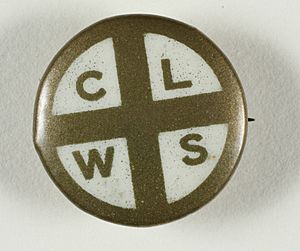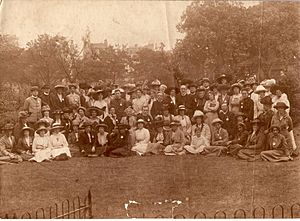Church League for Women's Suffrage facts for kids
The Church League for Women's Suffrage (CLWS) was a group that worked to get women the right to vote in the United Kingdom. It started in London in 1909. By 1913, the CLWS had groups all over England, Wales, Scotland, and Ireland.
Contents
What the CLWS Wanted to Achieve
The main goal of the Church League for Women's Suffrage was to make sure women could vote in both church matters and government elections, just like men. They believed that the Church should support women's equality.
The CLWS used peaceful methods like prayer and education to achieve its goals. They wanted to show that the Church cared about women's right to vote.
One important moment was when Edith Picton-Turbervill became the first woman to preach in a Church of Ireland church. This happened with the approval of the Archbishop of Dublin. She was speaking in Ireland because of the CLWS.
Important Members of the CLWS
The League was started in 1909 by Reverend Claude Hinscliff, who was its secretary for a long time. Other people who helped start the group included Margaret Nevinson and Olive Wharry.
Many notable women were members of the CLWS. These included Ellen Oliver, Frances Balfour, and Louise Creighton. More active members were Muriel Matters, Florence Canning, and the well-known Maude Royden. Lady Constance Lytton and Katherine Harley were also members.
Emily Wilding Davison, who sadly died during a horse race at Epsom while protesting for women's rights, was also a member. Her funeral was held at St George's, Bloomsbury, led by several church leaders who were also part of the League.
From Suffrage to Wider Equality
After World War I ended, a law called the Representation of the People Act 1918 was passed. This law gave many women the right to vote, but not all. Because of this, the Church League for Women's Suffrage decided to change its focus.
In 1919, the group changed its name to The League of the Church Militant. They continued to work for full voting equality for women, which was finally achieved with the Representation of the People (Equal Franchise) Act 1928. This new group also worked on other ideas, like allowing women to become priests and bishops in the Church.
However, because the group was still strongly linked to the suffrage movement, its work became limited. It eventually closed down before the 1930 Lambeth Conference, which is a big meeting of Anglican bishops from around the world. Another group, the Anglican Group for the Ordination of Women, took over its work.
See also
- List of women's organizations
- List of women's rights activists
- Timeline of women's suffrage
- Churches Militant, Penitent, and Triumphant - the phrase "the church militant" refers to Christians on earth, those serving others and working for a better world
 | Delilah Pierce |
 | Gordon Parks |
 | Augusta Savage |
 | Charles Ethan Porter |



